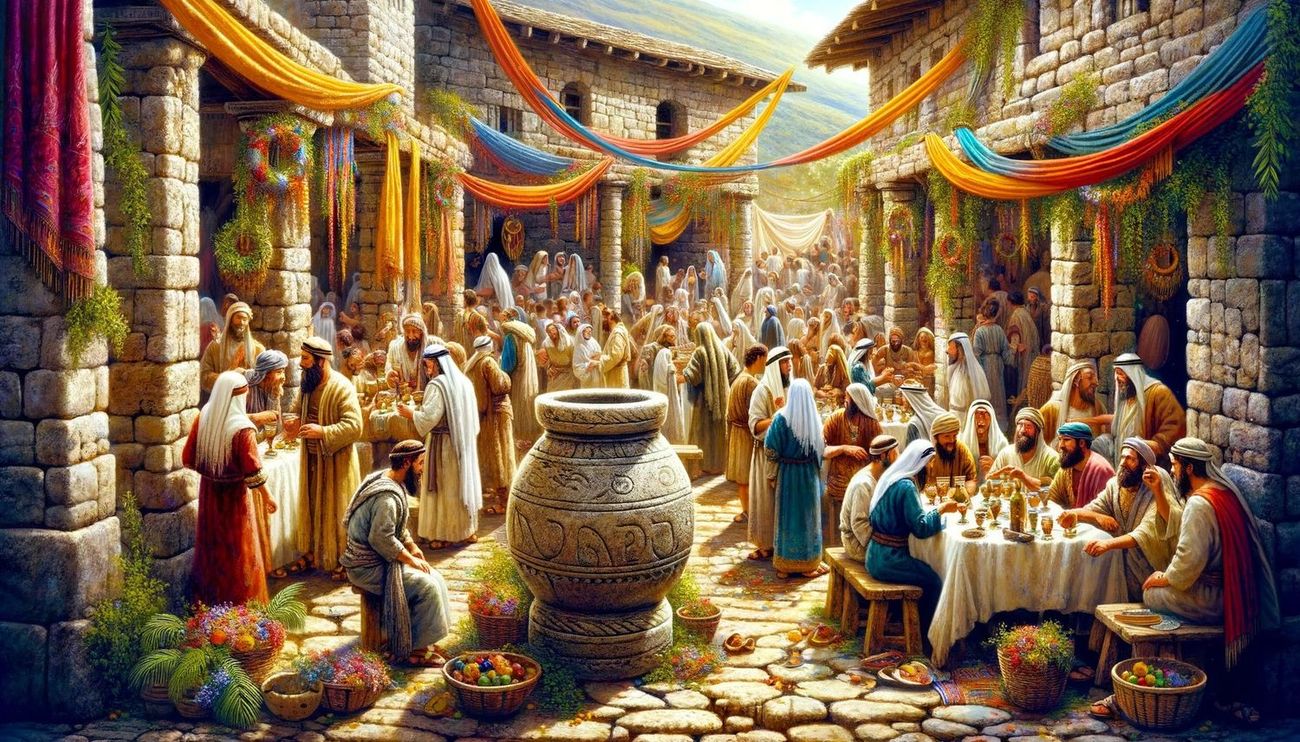Home>Christian Videos>Bible Stories>Which Gospels Contain The Wedding Feast At Cana


Bible Stories
Which Gospels Contain The Wedding Feast At Cana
Published: March 6, 2024
Jason DeRose, Managing Editor at Christian.net, uses his expertise in religion and journalism to deepen understanding of faith's societal impacts. His editorial leadership, coupled with a strong academic background, enriches the platform’s diverse content, earning him recognition in both journalism and religious circles.
Discover which gospels contain the famous Wedding Feast at Cana and explore this iconic Bible story in depth. Uncover the significance and meaning of this miraculous event.
(Many of the links in this article redirect to a specific reviewed product. Your purchase of these products through affiliate links helps to generate commission for Christian.net, at no extra cost. Learn more)
Table of Contents
Introduction
Which Gospels contain the Wedding Feast at Cana? This question delves into the specifics of the biblical accounts of the life and ministry of Jesus Christ. The Wedding Feast at Cana is a significant event in the New Testament, and it is essential to understand where it is documented within the Gospels. In this article, we will explore the different Gospels and their accounts of the Wedding Feast at Cana, shedding light on the unique perspectives and insights offered by each Gospel writer.
Read more: Which Disciples Wrote Gospels
The Gospel of John and the Wedding Feast at Cana
The Wedding Feast at Cana is exclusively documented in the Gospel of John, making it a distinctive event in the life of Jesus Christ. John's Gospel provides a detailed account of this significant occasion, offering unique insights into the ministry of Jesus. The narrative unfolds with Jesus and his disciples being invited to a wedding in the town of Cana in Galilee. During the celebration, the host runs out of wine, prompting Jesus' mother, Mary, to inform him of the situation. This sets the stage for one of the most well-known miracles performed by Jesus.
In John 2:1-11, the account describes how Jesus instructs the servants to fill six stone water jars with water. After this, he directs them to draw some out and take it to the master of the banquet. Upon tasting the water that had been turned into wine, the master of the banquet commends the bridegroom for saving the best wine until last. This miraculous transformation of water into wine at the Wedding Feast at Cana is the first of the seven signs recorded in the Gospel of John, signifying the beginning of Jesus' public ministry.
The inclusion of the Wedding Feast at Cana in the Gospel of John holds profound theological significance. It not only demonstrates Jesus' divine power to perform miracles but also symbolizes the arrival of the new covenant and the abundance of God's grace. The choice of this event as the inaugural miracle in John's Gospel underscores the theme of transformation and the revelation of Jesus as the bringer of spiritual fulfillment.
John's account of the Wedding Feast at Cana also highlights the intercessory role of Mary, the mother of Jesus. Her concern for the hosts of the wedding and her implicit trust in her son's ability to address the situation reflect her unique relationship with Jesus. This portrayal of Mary aligns with the broader theological themes present in the Gospel of John, emphasizing the interconnectedness of faith, divine intervention, and the manifestation of God's glory through Jesus Christ.
In summary, the Gospel of John provides a rich and detailed narrative of the Wedding Feast at Cana, offering profound insights into the ministry of Jesus and the theological significance of this miraculous event. The account in John's Gospel serves as a foundational element in understanding the divine nature of Jesus and the inauguration of his public ministry through acts of compassion and divine power.
The Synoptic Gospels and the Wedding Feast at Cana
While the Wedding Feast at Cana is prominently featured in the Gospel of John, it is notably absent from the Synoptic Gospels, namely Matthew, Mark, and Luke. The Synoptic Gospels focus on different aspects of Jesus’ life and ministry, and their omission of the Wedding Feast at Cana raises intriguing questions about the variations in the accounts of Jesus’ miracles and teachings.
Matthew, Mark, and Luke offer a comprehensive portrayal of Jesus’ earthly ministry, documenting numerous miracles, parables, and teachings. However, the absence of the Wedding Feast at Cana in these Gospels suggests that the authors chose to emphasize other aspects of Jesus’ life and message. Each Synoptic Gospel presents a distinct perspective on the life of Jesus, tailored to the specific audiences and theological themes they seek to address.
While the Synoptic Gospels do not include the Wedding Feast at Cana, they feature a wide array of miracles performed by Jesus, showcasing his divine authority and compassion. These miracles range from healing the sick and casting out demons to feeding the multitudes and calming the storm. The Synoptic Gospels underscore the multifaceted nature of Jesus’ ministry, highlighting his unwavering commitment to alleviating human suffering and demonstrating the power of God’s kingdom.
Despite the absence of the Wedding Feast at Cana in the Synoptic Gospels, their collective portrayal of Jesus’ miracles and teachings contributes to a comprehensive understanding of his identity as the Son of God and the embodiment of divine love and mercy. The Synoptic Gospels complement John’s account by presenting a diverse tapestry of Jesus’ actions and words, enriching the overall narrative of his transformative impact on the lives of individuals and communities.
The Significance of the Wedding Feast at Cana in the Gospels
The Wedding Feast at Cana holds profound significance in the Gospels, serving as a pivotal event that encapsulates the transformative power and divine nature of Jesus Christ. This miraculous occasion not only demonstrates Jesus' ability to perform extraordinary acts but also symbolizes the inauguration of a new era characterized by spiritual abundance and fulfillment.
1. Inauguration of Jesus' Public Ministry
The Wedding Feast at Cana marks the beginning of Jesus' public ministry, as it is the first recorded miracle in the Gospel of John. This deliberate choice by the Gospel writer underscores the significance of this event as a catalyst for revealing Jesus' divine identity and mission. The transformation of water into wine symbolizes the arrival of a new covenant, signifying the abundance of God's grace and the fulfillment of prophetic promises.
Read more: Which Gospels Tell The Christmas Story
2. Manifestation of Divine Power and Compassion
The miraculous nature of the Wedding Feast at Cana underscores Jesus' authority over the natural elements and his capacity to bring about profound transformations. By turning water into wine, Jesus not only addresses a practical need at the wedding celebration but also reveals his compassionate concern for the joy and well-being of the hosts and guests. This act of divine intervention exemplifies Jesus' inclination towards acts of kindness and his desire to alleviate human concerns.
3. Revelation of Jesus' Glory
The Wedding Feast at Cana serves as a revelation of Jesus' glory, as described in John's Gospel. The miraculous sign not only astonishes the wedding guests and the servants but also elicits faith and belief in the disciples who witness this extraordinary event. The manifestation of Jesus' glory through the transformation of water into wine foreshadows the subsequent signs and teachings that will further illuminate his divine nature and redemptive mission.
4. Symbolism of Spiritual Fulfillment
The abundance of wine resulting from the miracle at Cana symbolizes the spiritual fulfillment brought about by Jesus' presence and ministry. The superior quality of the wine presented by the master of the banquet after tasting the transformed water signifies the surpassing nature of the new covenant inaugurated by Jesus. This symbolism underscores the profound spiritual blessings and joy that accompany the arrival of God's kingdom through the person of Jesus Christ.
5. Intercessory Role of Mary
The presence of Mary, the mother of Jesus, at the Wedding Feast at Cana highlights her unique intercessory role in the unfolding of Jesus' ministry. Her concern for the hosts of the wedding and her implicit trust in her son's ability to address the shortage of wine exemplify her pivotal role in facilitating the manifestation of Jesus' divine power. This portrayal of Mary underscores her significance in the narrative and her connection to the broader themes of faith and divine intervention.
In summary, the Wedding Feast at Cana holds multifaceted significance in the Gospels, encompassing themes of divine inauguration, compassion, revelation, spiritual fulfillment, and intercessory intervention. This pivotal event not only showcases Jesus' miraculous abilities but also sets the stage for the unfolding of his redemptive mission and the revelation of God's abundant grace through the person of Jesus Christ.
Read more: Which Gospels Feature The Beatitudes
Conclusion
In conclusion, the Wedding Feast at Cana is a remarkable event documented in the Gospel of John, where Jesus performs his first public miracle by turning water into wine. This significant occasion holds profound theological significance, symbolizing the inauguration of Jesus' public ministry, the manifestation of divine power and compassion, the revelation of Jesus' glory, the symbolism of spiritual fulfillment, and the intercessory role of Mary. While the Synoptic Gospels do not include this specific event, their collective portrayal of Jesus' miracles and teachings enriches the overall narrative of his transformative impact. The diverse perspectives offered by the Gospels underscore the multifaceted nature of Jesus' ministry and contribute to a comprehensive understanding of his identity as the Son of God and the embodiment of divine love and mercy. The Wedding Feast at Cana stands as a testament to the abundant grace and transformative power of Jesus Christ, inviting believers to contemplate the depth of his divine nature and the enduring significance of his redemptive mission.













